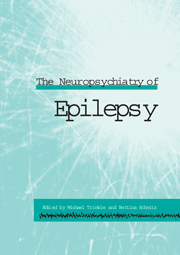Book contents
- Frontmatter
- Contents
- List of contributors
- Part I Background
- Part II Clinical aspects
- Part III Cognitive aspects
- 10 Dementia and epilepsy
- 11 The risk of cognitive decline in patients with refractory temporal lobe epilepsy
- 12 Behavioural and neuropsychological aspects of frontal lobe epilepsy
- Part IV Nonepileptic attacks
- Part V Treatment complications
- Part VI Treatment
- Index
10 - Dementia and epilepsy
Published online by Cambridge University Press: 05 October 2010
- Frontmatter
- Contents
- List of contributors
- Part I Background
- Part II Clinical aspects
- Part III Cognitive aspects
- 10 Dementia and epilepsy
- 11 The risk of cognitive decline in patients with refractory temporal lobe epilepsy
- 12 Behavioural and neuropsychological aspects of frontal lobe epilepsy
- Part IV Nonepileptic attacks
- Part V Treatment complications
- Part VI Treatment
- Index
Summary
Definitions and context
As Lishman (1998) has pointed out, the term ‘dementia’ has two potential meanings in medical practice: first, it may refer to a group of specific diseases, and second, it is used to describe a clinical syndrome that can have many causes. Although diseases in the former group are characterized by irreversible decline in function, the latter includes conditions in which decline can be arrested, or in some cases reversed.
Both ICD–10 (World Health Organization, 1992) and DSM–IV (American Psychiatric Association, 1994) offer detailed diagnostic criteria for the syndrome, with DSM–IV defining additional principles for diagnosing different varieties of dementia. Both of these, in attempting to ensure uniformity of populations that might be used for research purposes, adopt a ‘cookbook’ style of approach.
In this chapter, the term is used in the second of the meanings described by Lishman. ‘Dementia’ is regarded as an acquired global impairment of intellect, memory and personality, which is independent of any impairment of consciousness. The symptoms of dementia are typically of long duration, usually progressive and often irreversible, but none of these latter features are essential to the concept.
How the concept of epilepsy came to be linked historically with that of dementia, how these concepts became uncoupled, and how new connections came to be made between them, are components of a story that contains much of the history of psychiatry and of neurology.
- Type
- Chapter
- Information
- The Neuropsychiatry of Epilepsy , pp. 135 - 151Publisher: Cambridge University PressPrint publication year: 2002
- 1
- Cited by



